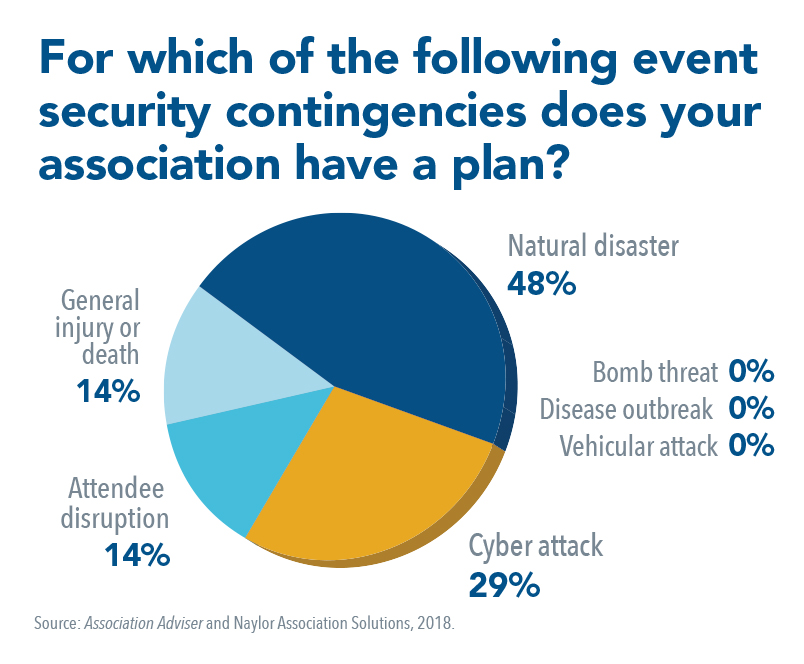Did You Know? Associations Prepared for a Natural Disaster or Cyber Attack, But Not Other Potential Crises
Any preschooler in the know will tell you that when disaster strikes, the smart thing to do is to “take a grown-up’s hand, follow the plan and you’ll be safe.”
But what if you’re the grown up? And in charge of planning for what to do in case of a crisis affecting your upcoming association event?
Our reader poll this month asked about the types of crises for which association event planners have a contingency or event emergency plan:

The results of this poll somewhat mirror a similar poll conducted in MPI’s Fall 2017 Meetings Outlook: 46 percent of respondents to that survey said their event is prepared for a natural disaster, and 31 percent claimed they have a plan for dealing with a potential cyber attack. Furthermore, more than half of the MPI survey respondents say they are least prepared to deal with vehicular violence or a crowd stampede, and 40 percent stated they are not prepared to handle an outbreak of disease.
No event planner wants to have a negative incident impact their conference or trade show, but hurricanes, wildfires, violence or other events that are either impossible or very difficult to control can still happen. “There seems to be a trend toward higher risk of something negative happening at an event,” said Lori Kinsey, CMP, executive director of MPI Northern California Chapter. “You cannot plan an event in a bubble and assume a negative incident will never happen at your events. The best way to prepare is to know your options for a response,” she continued.

MPI Northern California spent significant time creating a comprehensive crisis plan that covers all types of crises, from natural disasters to illness to violent attacks. The actions planned to keep attendees, staff and all others present safe came out of working and talking with each group of stakeholders to decide what course of action would be most effective.
Having an event emergency plan should be priority No. 1 if your association doesn’t already have one. It may take time to thoughtfully write out and communicate to all affected stakeholders – Kinsey says their event emergency plan was a year-long project that required a dedicated position. However, should the worst happen, your association does not want to be caught lacking the leadership and confidence to effectively mitigate the incident and keep everyone as safe as possible. Even if the worst does not happen, going through the exercise of crisis planning and advertising to your members that your leadership knows what they’ll do in case of event emergency can make your event (and membership in your association) even more attractive.
[soundcloud url=”https://api.soundcloud.com/tracks/421493709″ params=”color=#69d1ee&auto_play=false&hide_related=false&show_comments=true&show_user=true&show_reposts=false&show_teaser=true” width=”100%” height=”166″ iframe=”true” /]
Unfortunately, the Jewish Community Center knows firsthand the value of having a workable event emergency plan. In early 2017, JCCs across the U.S. received called-in bomb threats in a few separate waves. Thankfully, all threats were quickly determined to be false in part because each JCC had a good working relationship with local law enforcement who speedily swept and secured each facility. JCC employees who had also been briefed on their facility’s crisis plan confidently and quickly evacuated their area of children, class attendees and other patrons so that any injuries would have been as minimal as possible. Having (and successfully activating) a crisis plan isn’t fun but it helps reassure all stakeholders that they are safe and cared for.
Second, if your event team isn’t already reading the fine print on venue or service contracts, start making that a regular practice so you’ll know your options in case a crisis threatens to delay, truncate or cancel your event. The Fall 2017 Meetings Outlook from MPI relates the story of an association that had planned a meeting in Florida for September 2017, the same week that Hurricane Irma barreled toward the state. The association wanted to preemptively move the meeting, but a clause in their venue contract would not allow cancellation without financial penalty until the hurricane was actually over the venue. Thankfully, the association worked out a solution with the venue management that allowed them to move their event to another property in the U.S. northeast in exchange for holding next year’s event in Florida, but the lesson here is this: Read the fine print, and don’t sign a contract until your association and the venues with which you want to do event business can agree on Plan B in case uncontrollable events threaten Plan A.
Emergencies at events or during the normal course of business may not be avoidable, but preparation for how your association will respond to one is necessary and important. If your association doesn’t yet have an event emergency event plan, check out some event planning resources available through the ASAE Buyers’ Guide.

